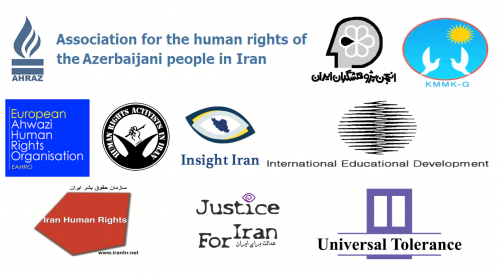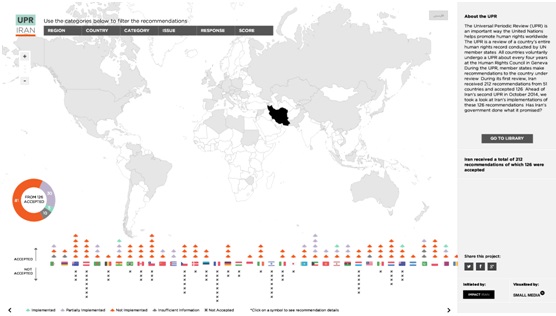Promotion and protection of human rights: human rights situations and reports of special rapporteurs and representatives
Andorra, Australia, Austria, Belgium, Bulgaria, Canada, Croatia, Cyprus, Czech Republic, Denmark, Estonia, Finland, France, Germany, Greece, Honduras, Hungary, Iceland, Ireland, Israel, Italy, Latvia, Liechtenstein, Lithuania, Luxembourg, Malta, Micronesia (Federated States of), Monaco, Netherlands, Norway, Poland, Portugal, Republic of Moldova, Romania, San Marino, Slovakia, Slovenia, Spain, Sweden, the former Yugoslav Republic of Macedonia, United Kingdom of Great Britain and Northern Ireland and United States of America: draft resolution
Situation of human rights in the Islamic Republic of Iran
The General Assembly, Guided by the Charter of the United Nations, as well as the Universal Declaration of Human Rights,1 the International Covenants on Human Rights 2 and other international human rights instruments,
Recalling its previous resolutions on the situation of human rights in the Islamic Republic of Iran, the most recent of which is resolution 69/190 of 18 December 2014,
1. Takes note of the report of the Secretary-General of 31 August 2015 submitted pursuant to resolution 69/1903 and the report of the Special Rapporteur of the Human Rights Council of 6 October 2015, 4 submitted pursuant to Council resolution 28/21 of 27 March 2015,5 both on the situation of human rights in the Islamic Republic of Iran;
2. Continues to welcome the pledges made by the President of the Islamic Republic of Iran with regard to some important human rights issues, particularly on eliminating discrimination against women and members of ethnic minorities, and on greater space for freedom of expression and opinion;
3. Acknowledges proposals for legislative and administrative changes in the Islamic Republic of Iran, which, if properly implemented, would address some human rights concerns, including portions of the new Code of Criminal Procedure;
4. Welcomes recent announcements by the Government of the Islamic Republic of Iran of increased services for victims of domestic violence, as well as draft legislation that may increase penalties for perpetrators of violence against women;
5. Also welcomes steps taken to improve access to education for persons belonging to some ethnic minorities in their native languages;
6. Acknowledges the participation of the Government of the Islamic Republic of Iran in its second universal periodic review, and welcomes its acceptance of 130 recommendations, as well as its recent engagement with human rights treaty bodies through the submission of periodic national reports, while remaining concerned about the Government’s implementation record in respect of the recommendations that it accepted during its first universal periodic review;
7. Expresses serious concern at the alarming high frequency of and increase in the carrying-out of the death penalty, in disregard of internationally recognized safeguards, including executions undertaken without notification to the prisoner’s family members or legal counsel, and at the continuing imposition and carrying -out of the death penalty against minors and persons who at the time of their offence were under the age of 18, in violation of the obligations of the Islamic Republic of Iran under both the Convention on the Rights of the Child6 and the International Covenant on Civil and Political Rights, 2 and for crimes that do not qualify as the most serious crimes, and calls upon the Government of the Islamic Republic of Iran to abolish, in law and in practice, public executions, which are contrary to the 2008 prohibition of this practice by the former head of the judiciary, and executions carried out in violation of its international obligations or in the absence of respect for internationally recognized safeguards;
8. Calls upon the Government of the Islamic Republic of Iran to ensure, in law and in practice, that no one is subjected to torture or other cruel, inhuman or degrading treatment or punishment, which may include sexual violence, in conformity with the constitutional guarantees of the Islamic Republic of Iran and international obligations;
9. Urges the Government of the Islamic Republic of Iran to uphold, in law and in practice, procedural guarantees to ensure fair trial standards of law, including timely access to legal representation of one’s choice, the right not to be subjected to torture, cruel and inhuman or degrading treatment or punishment and consideration of bail and other reasonable terms for release from custody pending trial, and urges the Government to cease enforced disappearances and the widespread and systematic use of arbitrary detention;
10. Calls upon the Government of the Islamic Republic of Iran to address the poor conditions of prisons, to eliminate the denial of access to adequate medical treatment and the consequent risk of death faced by prisoners and to put an end to the continued and sustained house arrest of leading opposition figures from the 2009 presidential elections despite serious concerns about their health, as well as the pressure exerted upon their relatives and dependants, including through arrest;
11. Also calls upon the Government of the Islamic Republic of Iran, including the judicial and security branches, to end widespread and serious restrictions, in law and in practice, on the right to freedom of expression, opinion, association and peaceful assembly, including through the ongoing harassment, intimidation, arbitrary detention and prosecution of, as well as the denial of access to higher education for, political opponents, human rights defenders, women’s and minority rights activists, labour leaders, students’ rights activists, academics, filmmakers, journalists, bloggers, social media users, religious leaders, artists, lawyers, recognized and unrecognized religious minorities and their families, and urges the Government to release persons arbitrarily detained for the legitimate exercise of these rights, to consider rescinding unduly harsh sentences, including the death penalty and long-term exile, for exercising such fundamental freedoms and to end reprisals against individuals cooperating with the United Nations human rights mechanisms;
12. Strongly urges the Government of the Islamic Republic of Iran to eliminate, in law and in practice, all forms of discrimination and other human rights violations against women and girls, to take measures to ensure protection for women and girls against violence, to address the alarming incidence of child, early and forced marriage, to promote women’s participation in decision-making processes and, while recognizing the high enrolment of women in all levels of education in the Islamic Republic of Iran, to lift restrictions on women’s equal access to all aspects of education and women’s equal participation in the labour market and in all aspects of economic, cultural, social and political life;
13. Calls upon the Government of the Islamic Republic of Iran to eliminate, in law and in practice, all forms of discrimination and other human rights violations against persons belonging to ethnic, linguistic or other minorities, including but not limited to Arabs, Azeris, Balochis and Kurds and their defenders;
14. Expresses serious concern about ongoing severe limitations and restrictions on the right to freedom of thought, conscience, religion or beli ef and restrictions on the establishment of places of worship, as well as attacks against places of worship and burial, as well as other human rights violations, including but not limited to harassment, persecution and incitement to hatred that lead to vio lence against persons belonging to recognized and unrecognized religious minorities, including Christians, Jews, Sufi Muslims, Sunni Muslims, Zoroastrians and members of the Baha’i faith and their defenders, and calls on the Government of the Islamic Republic of Iran to release the seven Baha’i leaders declared by the Working Group on Arbitrary Detention to have been arbitrarily detained since 2008, and to eliminate, in law and in practice, all forms of discrimination, including the closure of businesses, and other human rights violations against persons belonging to recognized and unrecognized religious minorities;
15. Urges the Government of the Islamic Republic of Iran to launch a comprehensive accountability process in response to cases of serious human rights violations, including those involving the Iranian judiciary and security agencies and those following the 2009 presidential elections, and calls on the Government to end impunity for such violations;
16. Strongly urges the Government of the Islamic Republic of Iran to ensure credible, transparent and inclusive parliamentary elections in 2016, and to allow all candidates to stand in a manner consistent with the Universal Declaration of Human Rights1 and the International Covenant on Civil and Political Rights2 in order to guarantee the free expression of the will of the Iranian people, and to that end calls upon the Government to allow independent national and international observation;
17. Calls upon the Government of the Islamic Republic of Iran to implement its obligations under those human rights treaties to which it is already a party, to withdraw any reservations that it has made where such reservations are overly general, imprecise or could be considered incompatible with the object and purpos e of the treaty, to consider acting upon the concluding observations concerning the Islamic Republic of Iran adopted by the bodies of the international human rights treaties to which it is a party and to consider ratifying or acceding to the international human rights treaties to which it is not already a party;
18. Also calls upon the Government of the Islamic Republic of Iran to engage with international human rights mechanisms by:
(a) Cooperating fully with the Special Rapporteur on the situation of human rights in the Islamic Republic of Iran, including by accepting the repeated requests made by the Special Rapporteur to visit the country in order to carry out his mandate;
(b) Cooperating with other special mechanisms, including by facilitating long-standing requests for access to the country from thematic special procedures mandate holders, whose access to its territory has been restricted or denied, despite the standing invitation issued by the Islamic Republic of Iran, without imposing undue conditions upon those visits;
(c) Implementing all accepted universal periodic review recommendations from its first cycle, in 2010, and its second cycle, in 2014, with the full and genuine participation of independent civil society and other stakeholders in the implementation process;
(d) Building upon the engagement of the Islamic Republic of Iran with the universal periodic review process by continuing to explore cooperation on human rights and justice reform with the United Nations, including the Office of the United Nations High Commissioner for Human Rights;
(e) Following through on its commitment to establish an independent national human rights institution, made in the context of its first universal periodic review by the Human Rights Council, with due regard for the recommendation of the Committee on Economic, Social and Cultural Rights;
19. Further calls upon the Government of the Islamic Republic of Iran to translate the pledges made by the President of the Islamic Republic of Iran with respect to human rights concerns into concrete action that results in demonstrable improvements as soon as possible and to ensure that its national laws are consistent with its obligations under international human rights law and that they are implemented in accordance with its international obligations;
20. Calls upon the Government of the Islamic Republic of Iran to address the substantive concerns highlighted in the reports of the Secretary-General and the Special Rapporteur on the situation of human rights in the Islamic Republic of Iran, as well as the specific calls to action found in previous resolutions of the General Assembly, and to respect fully its human rights obligations in law and in practice;
21. Strongly encourages the relevant thematic special procedures mandate holders to pay particular attention to, with a view to investigating and reporting on, the human rights situation in the Islamic Republic of Iran;
22. Requests the Secretary-General to report to the General Assembly at its seventy-first session on the progress made in the implementation of the present resolution, including options and recommendations to improve its implementation, and to submit an interim report to the Human Rights Council at its thirty-first session;
23. Decides to continue its examination of the situation of human rights in the Islamic Republic of Iran at its seventy-first session under the item entitled “Promotion and protection of human rights”.
Original document
Gefällt mir Wird geladen …













